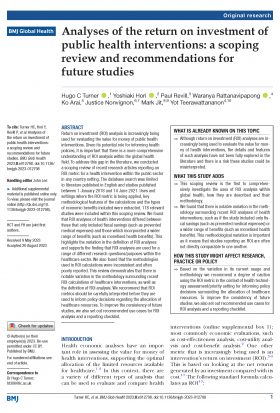This website uses cookies so that we can provide you with the best user experience possible. Cookie information is stored in your browser and performs functions such as recognising you when you return to our website and helping our team to understand which sections of the website you find most interesting and useful.
Analyses of the return on investment of public health interventions: a scoping review and recommendations for future studies

รายละเอียดเพิ่มเติม
Abstract
Return on investment (ROI) analysis is increasingly being used for evaluating the value for money of public health interventions. Given its potential role for informing health policies, it is important that there is a more comprehensive understanding of ROI analysis within the global health field. To address this gap in the literature, we conducted a scoping review of recent research articles reporting an ROI metric for a health intervention within the public sector in any country setting. The database search was limited to literature published in English and studies published between 1 January 2018 and 14 June 2021. Uses and settings where the ROI metric is being applied, key methodological features of the calculations and the types of economic benefits included were extracted. 118 relevant studies were included within this scoping review. We found that ROI analyses of health interventions differed between those that only included fiscal savings (such as prevented medical expenses) and those which incorporated a wider range of benefits (such as monetised health benefits). This highlights the variation in the definition of ROI analyses and supports the finding that ROI analyses are used for a range of different research questions/purposes within the healthcare sector. We also found that the methodologies used in ROI calculations were inconsistent and often poorly reported. This review demonstrates that there is notable variation in the methodology surrounding recent ROI calculations of healthcare interventions, as well as the definition of ROI analysis. We recommend that ROI metrics should be carefully interpreted before they are used to inform policy decisions regarding the allocation of healthcare resources. To improve the consistency of future studies, we also set out recommended use cases for ROI analysis and a reporting checklist.
Open access: https://gh.bmj.com/content/8/8/e012798?rss=1




